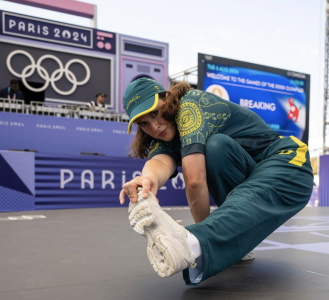Aussie dancer becomes centre of controversy after Olympic performance: ‘It’s an abomination’
By
Seia Ibanez
- Replies 38
The Olympic Games have long been a stage for the world's most elite athletes to showcase their talents in a variety of sports, from the traditional track and field events to the more modern additions like skateboarding and surfing.
However, the inclusion of breaking, commonly known as breakdancing, in the Olympic program has sparked a whirlwind of controversy, with the debut of the sport at the Games drawing both criticism and mockery.
Australian breaking dancer Rachael Gunn, known in the breaking community as Raygun, became the centre of this global controversy during her Olympic performance.
Despite her dedication and passion for the sport, Raygun's efforts were met with harsh criticism from audiences who questioned the legitimacy of breaking into an Olympic sport.
The criticism was not just limited to the sport itself; Raygun's personal style and performance were also subjected to ridicule on social media platforms.
Comments ranged from backhanded compliments about her courage to step onto the Olympic stage to outright derision comparing her dance moves to ‘when a calf cramps up in bed’.
‘I always like to give the new sports a chance, so I can confirm it’s an ABOMINATION. The lowest bar ever to be cleared for an Olympic medal,’ one commented.
‘Never watched breaking before, but I can already tell Raygun doesn’t have a chance in this event,’ another said.
‘The Aussie B-girl Raygun dressed as a school PE teacher complete with a cap while everyone else is dressed in funky breaking outfits has sent me,’ a third added.
‘It looks like she’s giving her (opponent) detention for inappropriate dress at school.’
Despite the negative feedback, Raygun's participation in the Olympics is a testament to her skill and the growing recognition of breaking as a competitive discipline.
Unfortunately, her journey in the Games was cut short as she lost all her battles in the group stage, leading to an early exit from the competition.
‘Props to Raygun for having the guts to go out there…but this was the most second-hand embarrassment I’ve ever felt,’ one user said.
The debate over whether breaking should be considered a sport is not new, but its inclusion in the Olympics has brought the conversation to the forefront.
Critics argue that it is ‘not a sport’ and does not require the same level of skill as other Olympic disciplines.
Despite the backlash, the breaking event continued, with Japan's B-Girl Ami taking home the inaugural gold medal in a triumphant victory over Lithuania's B-Girl Nicka.
The bronze medal was awarded to China's B-Girl 671.
You can watch Raygun’s performance below:
Credit: @reyahthelastdragon / TikTok
 What do you think of Raygun’s performance? Do you believe breaking has a place in the Olympics? Share your experiences and join the conversation in the comments below!
What do you think of Raygun’s performance? Do you believe breaking has a place in the Olympics? Share your experiences and join the conversation in the comments below!
However, the inclusion of breaking, commonly known as breakdancing, in the Olympic program has sparked a whirlwind of controversy, with the debut of the sport at the Games drawing both criticism and mockery.
Australian breaking dancer Rachael Gunn, known in the breaking community as Raygun, became the centre of this global controversy during her Olympic performance.
Despite her dedication and passion for the sport, Raygun's efforts were met with harsh criticism from audiences who questioned the legitimacy of breaking into an Olympic sport.
The criticism was not just limited to the sport itself; Raygun's personal style and performance were also subjected to ridicule on social media platforms.
Comments ranged from backhanded compliments about her courage to step onto the Olympic stage to outright derision comparing her dance moves to ‘when a calf cramps up in bed’.
‘I always like to give the new sports a chance, so I can confirm it’s an ABOMINATION. The lowest bar ever to be cleared for an Olympic medal,’ one commented.
‘Never watched breaking before, but I can already tell Raygun doesn’t have a chance in this event,’ another said.
‘The Aussie B-girl Raygun dressed as a school PE teacher complete with a cap while everyone else is dressed in funky breaking outfits has sent me,’ a third added.
‘It looks like she’s giving her (opponent) detention for inappropriate dress at school.’
Despite the negative feedback, Raygun's participation in the Olympics is a testament to her skill and the growing recognition of breaking as a competitive discipline.
Unfortunately, her journey in the Games was cut short as she lost all her battles in the group stage, leading to an early exit from the competition.
‘Props to Raygun for having the guts to go out there…but this was the most second-hand embarrassment I’ve ever felt,’ one user said.
The debate over whether breaking should be considered a sport is not new, but its inclusion in the Olympics has brought the conversation to the forefront.
Critics argue that it is ‘not a sport’ and does not require the same level of skill as other Olympic disciplines.
Despite the backlash, the breaking event continued, with Japan's B-Girl Ami taking home the inaugural gold medal in a triumphant victory over Lithuania's B-Girl Nicka.
The bronze medal was awarded to China's B-Girl 671.
You can watch Raygun’s performance below:
Credit: @reyahthelastdragon / TikTok
Key Takeaways
- Breaking has been heavily criticised in its Olympic debut and will not be included in the next Olympics in Los Angeles.
- Australian breakdancer Rachael Gunn, known as Raygun, was mocked on social media after failing to progress past the group stage.
- Fans and critics on social media have dismissed breaking as a legitimate sport, with some describing it as an 'abomination' and 'turbo cringe.'
- The inaugural Olympic gold medal for women's breaking was won by Japan's B-Girl Ami, with Raygun's performance notably underwhelming compared to her competitors.








